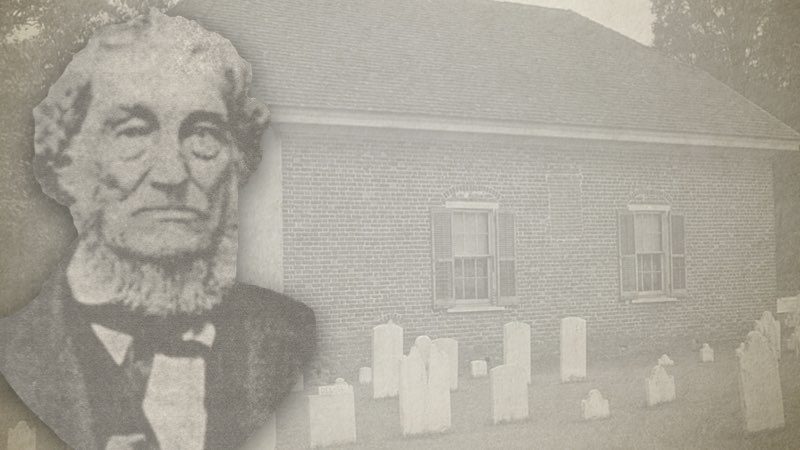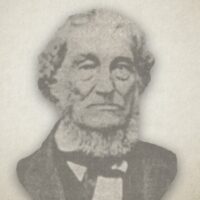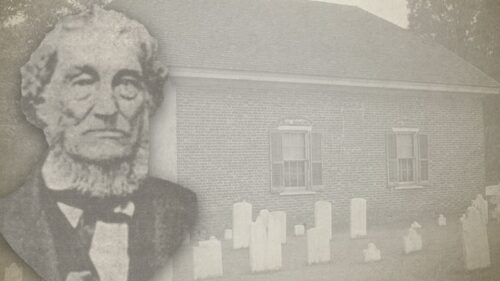
A Letter To Gilbert Beebe Regarding Absolute Predestination
Brother Beebe,
Having understood that several of our Brethren in different places, as well as others, have so construed my piece on the Absolute Predestination of All things, as to infer that I represent God to be the Author of sin, I have been led to look over that article to see if I did make any slip on that point, and leave any sentence so worded as to give just ground for their construction. But I do not find a single sentence therein, that by any fair interpretation, represents God as being the Author of sin in general, or as compelling the creature to a sinful choice by any arbitrary force put upon his mind. I think, if any of our Brethren, who have taken up this wrong idea of the article on Predestination would take the trouble to examine it again impartially, they will find that so far from my representing God as being so the author of sin as to exempt man from guilt in his sinful transactions, I have endeavored particularly to show, while the predestination of God determines that sin, and the sinful acts of men and devils, shall result in the accomplishment of His own glorious purposes, that this predestination does not destroy the free volition of man, but leaves him free to act according to his nature, and consequently conscious of his guilt, and justly subject to punishment for his crimes, as in the case of Joseph’s brethren and of the Assyrian, and of Judas and the Jews.
Persons who make these objections to my views as published seem to overlook the fact that I speak of God’s government in this case as being a predestination, or pre-determination, to permit such and such acts of depravity to take place, and to cause them to produce certain results, and to transpire under certain circumstances; and not a predestination to compel men to perform those acts.
I know that many persons have, in their minds, so attached to the term predestination the idea of arbitrary force exerted upon the minds of men, compelling them to act, as never to attend to any other explanation given to the subject. Whereas by attaching such an idea to the term predestination when spoken of God, they divest Him of that infinite wisdom and understanding that belongs to Him, and bring Him down to a level with us short-sighted mortals. Man when he absolutely predetermines as act or event, acts foolishly, for he knows not what an hour may bring forth. Not so with God. He can, and does “declare the end from the beginning” with all the attendant circumstances.
Persons who suffer their minds to be thus swayed by their prejudices against a term they did not understand, can scarcely fail of attaching to the combined terms, absolute predestination, every thing awful and tyrannical. The plain natural meaning of the term absolute is unconditional, in this sense, and in this sense only it is used in this connection. And while we contend for an absolute or unconditional predestination, we deny that there is any thing like an arbitrary purpose or act to be found in the government of God.
In order, if possible, to be more clearly understood upon this point, I will offer a few additional remarks:
1st. That such is the depravity of human nature, that so sure as he is given up to the sway of any one of his passions, and comes into contact with circumstances exciting him to the gratification of that passion, so assuredly he perpetrates the crime to which his inborn depraved passion urges him. David, in the case of Bathsheba and Uriah, being left to the influence of his passion, needed but the exciting circumstance of seeing from “the roof of the king’s house the woman washing herself” to lead him on to that course which resulted in the consummation of his whole crime. David therefore instead of charging this act to God, was conscious that it was chargeable only to the depravity of his own heart, and therefore justly says to Nathan, “I have sinned against the Lord.” And yet there is no room left to suppose that this whole affair was not embraced in the pre-determinate purpose of God, for it was a very important link in that chain by which Shiloh (The Lord Jesus) descended from Judah (Matthew 1:6).
2nd. That while the predestination of God extends to every event that takes place in the universe, it puts no other force upon the minds of sinful agents than that of restraint. God has predestinated that men shall not act out the depravity of their hearts any further than He for wise purposes has predestinated to let them go in sin. For producing this restraint, He employs various instruments, as education, public opinion, etc., and also frequently causes the various passions of man to counteract the undue influence one of the another. In a word, the predestination of God secures, that so far as He has determined to leave any one to act out the depravity of his heart, so far attending circumstances shall be favorable thereto; as in the case of Pharaoh: “Even for the same purpose have I raise thee up.” (that is, by divine providence, to the throne of Egypt, that full opportunity may be given thee to show the haughtiness and cruelty of thy heart), “that I might show My power in thee,” (in causing thy arrogance and rage to work thy own destruction and My people’s deliverance.) So of Judas, the thirty pieces of silver are secured to him for a bait. On the other hand, wherein God has determined to restrain the wrath of man, or to put restraints upon his depravity, He places him in circumstances calculated to exert the necessary force upon his passions.
But from whence comes depravity and sin? Sin exists in the world in the depravity of man, and yet in its origin it was non-existent: not a creature, nor an eternal existence. God is but the innocent cause, if I may use the expression of its having an existence. Had not God brought intelligent creatures into existence sin could never have had a being; and if God had not created and placed those creatures under a law, and left them to the free exercise of their own wills whether to obey or not, sin would never have become an existence in the world; and yet not God but angels and men, each in his sphere, brought it into existence.
The existence of sin in the world may be aptly illustrated by the existence of darkness. Darkness could never had had an existence had not God made creatures needing the medium of material light, in order to the exercise of their organs of vision. For in God “ is no darkness at all.” But when creatures were produced needing material light to enable them to see, the absence of that light is what we call darkness. In reference to the statement in Genesis 1:2, “And darkness was upon the face of the deep,” I understand it to be spoken in relation to the progress of creation, and to be an intimation that the material light suiting this material world was not then created, and that this darkness, or absence of light, was no more a direct production of God than was the formless state of matter in its original production. The one was the absence of that order which was afterwards given to the matter created. The other, the absence of that light which creatures would need to the use of sight. It is true God has given to material darkness a permanent being in relation to creatures on earth by “dividing between the light and between the darkness,” instead of giving to the light an entire sway over the earth.
So of sin, to go back no farther than its relation to man, God made “man upright,” but made him a dependent and an accountable creature and therefore laid him under obligations to “be holy in heart and life” unto God, or in other words, to be entirely and voluntarily devoted to the will of the Creator. And being thus created, God gave him a command as a test by which to prove his voluntary subjection to his Creator or his voluntary holiness, I say to prove whether he would be holy to God. (I know the general idea is, even among those whom we esteem sound, that God created man a holy being, but this is an idea I have not been able, perhaps from inferiority of intellect to comprehend), that is, to say in relation to heart holiness or voluntary devotion to God. I know that the word holy is sometimes used to denote mere freedom from impurity, in this sense I cheerfully give in to an idea that man was created holy, that he came from the hands of the Creator pure. Man being thus put to the test, he soon showed destitution of that voluntary holiness, that self- devotedness to God, which, his being a creature, laid him under obligation to exercise. This want of holiness was sin; it was a violation of his obligation and a transgression of the command under which he was placed. And I do not know but that Adam’s thus preferring his own gratification to submission to the government of God was as much a natural or necessary consequence of his being left to choose for himself as is the succession of darkness to the withdrawal of light. I know that being thus left to his own choice, the very first occasion finds him choosing to set up for himself, for “Adam was not deceived;” and I know that God with certainty knew that this would be the course of the man; hence the setting up of Christ before the foundation of the world. The act was Adam’s own, it was not that Satan infused any evil principle into him. Satan was only an instrument in beguiling Eve, of exciting him to a choice upon the point. Man having made his choice to serve self rather than God; the penalty of the command took immediate effect, and depravity runs through the whole human family, and became from the choice of Adam, the reigning power over the human heart, reigning unto death; the penal requisition of the law giving it that power, “for the strength of sin is the law.” Hence man exits under “the law of sin and death,” from which he could be ransomed only by the blood of Christ; and delivered only by being brought into a new existence as a new creature in Christ, and that only by the power of God.
Do any ask what has predestination to do with this? I answer that it has this much to do with it; that God predestinated man to be, or pre- determined to make him just such a creature as he was, and to leave him to encounter the temptation in his own creature weakness, that he might act freely without the restraints of communicated holiness; with the certainty of his falling and becoming “dead in trespasses and sins,” and thus an occasion should be offered for bringing in the “Sun of Righteousness.” And here is the counterpart of the figure of darkness. If creatures had not been so formed as to need material light, there would have been no occasion for the sun; if man had not so fallen, as to need a Divine Savior, the Word had not been made flesh. Hence, says Christ, “I come a light unto the world.” And in the coming of Christ there is “Glory to God in the highest, on earth peace, good will towards man.” If “glory to God in the highest” came through Christ, then predestination has assuredly secured a greater good by man’s being left to fall than could have come to the universe by his being supported and confirmed by the power of God in his original state of happiness. Thus the predestination of God, instead of making God the author of sin, secured that all the glory of redemption should result from the malice of Satan and the native weakness of man.
Fairfax County, Virginia, July 7, 1834
S. Trott.
Samuel Trott (1783-1866) was an American Primitive Baptist preacher. He was appointed pastor of the Welsh Tract Baptist Church, Newark, Delaware. In 1832, he drafted the Black Rock Address which drew a line between the Hyper and Moderate Calvinists. The Hypers assumed the name “Old School” while the Moderates were called “New School”. The Schools were based on the writings of two English theologians—John Gill (1770’s), representing the Old School; Andrew Fuller (1780’s), representing the New School. Henceforth, the Fullerite teachings which splintered the Particular Baptist churches of England eventually divided the Primitive Baptist churches of America.




